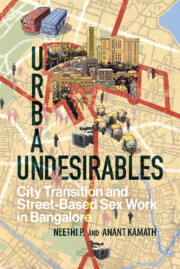2 - Narrators and Settings
Published online by Cambridge University Press: 30 June 2022
Summary
Narratives are central to building the imaginary of a city, as well as the character of its transition. Narratives and imaginaries tell the story of a city more than objective cartographic maps. However, urban imaginaries – including policy plans, popular or journalistic chronicles and academic or policy analyses of urban transition – are usually founded on narratives of mostly Citizens and Populations. Communities of pseudo-invisibles that suffer the wariness of urban transition are invisible – not as physically obscure but as absent in the popular and policy meta-narrative of who the city is.
The dominant nature of both urban imaginaries and urban transition processes are deeply imbricated with a literate, codified and, therefore, homogenised social cohort, that is, the privileged. We say ‘homogenised’ with caution: indeed, there are varying shades among the privileged, as they are certainly not monolithic, but they are homogenised with respect to their convergence towards a narrow, limited spectrum of urban imaginary and transition, which is usually in neat concordance with an Anglo-American catalogue of options. On the other hand, sections such as our street-based sex workers are non-literate for the most part, do not have documented histories and are highly heterogenised across gender, age, caste and clientele, with their imaginaries and transition experiences hinging upon their collective memory. Their narratives are almost entirely oral (and not codified), swirling with subjectivity (as opposed to uniform and objective) and have been marginalised. Therefore, we can visualise a direct link between (a) the literate, codified, objective, uniform and, therefore, dominant urban imaginary and construction of urban modernity and (b) the non-literate, oral, subjective, scrambled and, therefore, marginalised experience of production of urban imaginary and trajectory of urban transition. The latter mapping corresponds perfectly with our street-based sex workers in terms of their status as pseudo-invisibles, their condition of advanced marginality and their experience of urban transition.
For our purpose here, among street-based sex workers, subjectivity and a scrambled sense of visualising the city are not obstacles but complications to be cherished. As knotty as the task was, collecting their stories and experiences – occasionally gauzy, every now and then exaggerated and usually overrun with emotion – was the very point for us.
- Type
- Chapter
- Information
- Urban UndesirablesCity Transition and Street-Based Sex Work in Bangalore, pp. 32 - 46Publisher: Cambridge University PressPrint publication year: 2022

